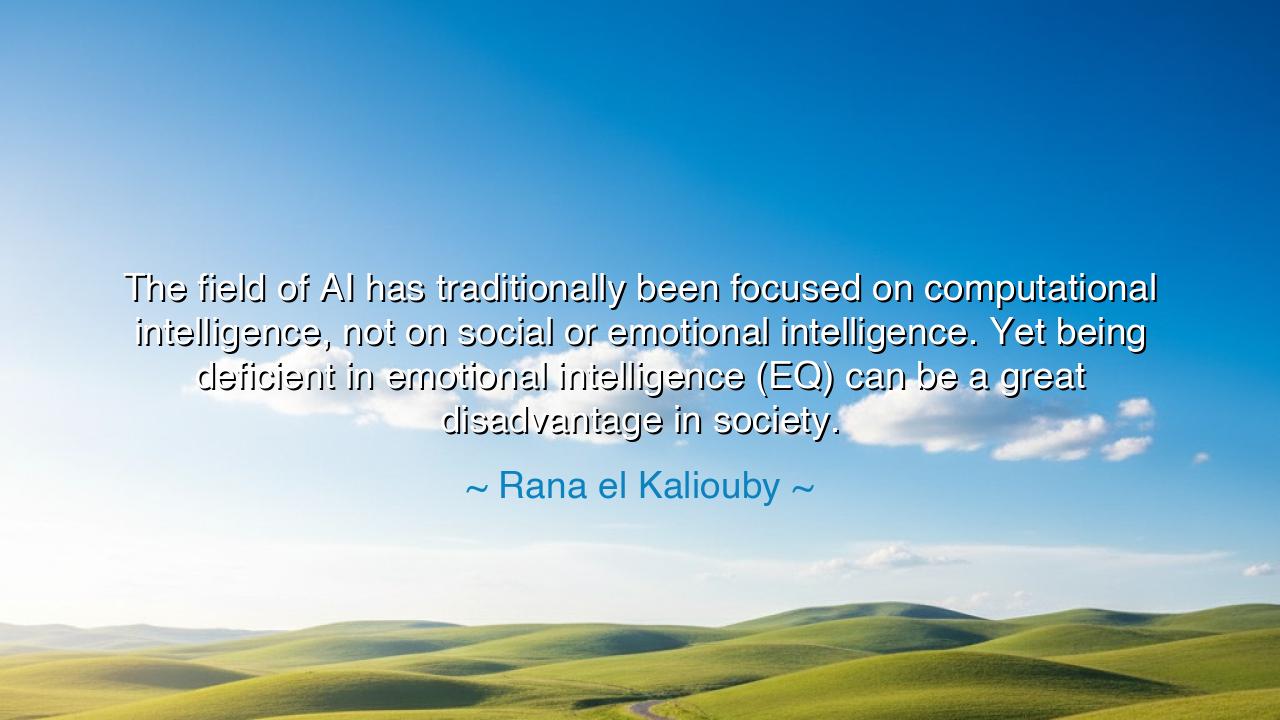
The field of AI has traditionally been focused on computational
The field of AI has traditionally been focused on computational intelligence, not on social or emotional intelligence. Yet being deficient in emotional intelligence (EQ) can be a great disadvantage in society.






In the words of Rana el Kaliouby, a pioneer who sought to give machines the gift of empathy, there lies a truth both new and ancient: “The field of AI has traditionally been focused on computational intelligence, not on social or emotional intelligence. Yet being deficient in emotional intelligence (EQ) can be a great disadvantage in society.” These words are not spoken merely for scholars of code and data, but for all who walk the path of creation and understanding. For what she speaks of — emotional intelligence, or the wisdom of the heart — is not a luxury of feeling, but a necessity of being.
In the beginning, humankind built tools of stone and fire. Then they built machines of metal and wire. Now they build machines that think. Yet even as they rise to such marvels, there is danger in forgetting the softer essence that makes them human. Computational intelligence — the logic of the mind — is sharp as a blade, precise and unyielding. But social and emotional intelligence — the language of empathy, compassion, and connection — is the art that keeps the blade from wounding its master. Without the balance of these two forces, creation becomes clever but cold, powerful but blind.
History offers us a mirror. In the days of ancient Athens, the philosopher Aristotle taught that reason alone cannot guide the soul. He said that virtue lies in finding harmony between thought and feeling — between logos and pathos. The mightiest empires, he warned, fell not from lack of knowledge, but from lack of empathy. When the heart was silenced, cruelty and arrogance followed. And so it is today, when machines rise as servants of our intellect; if we do not teach them empathy, we risk teaching them indifference.
The story of Rana el Kaliouby herself is one of restoring balance between the mechanical and the emotional. A daughter of Egypt who journeyed into the halls of science, she saw how the faces of people in the digital world grew silent — how technology failed to understand tears, joy, or sorrow. And so she built systems that could recognize emotion, that could read the subtle poetry of the human face. Her vision was not to make machines feel, but to help them understand feeling — that they might serve humanity better. Through her, we are reminded that technology is not the enemy of empathy, but its next disciple, if only we shape it wisely.
To be deficient in emotional intelligence is to be rich in thought but poor in wisdom. A society that neglects EQ builds towers of progress but hollow hearts within them. We see it already — in workplaces where algorithms decide but do not care, in communities where digital voices grow louder than human ones, in lives connected by screens yet starved of touch. To thrive in such a world, one must not only think clearly but feel deeply — to know how to listen, how to sense the unspoken, how to lead with compassion rather than calculation.
Therefore, let this be the lesson: Intellect without empathy is strength without direction. As you master the tools of logic and creation, do not forget the music of the heart. Cultivate emotional intelligence as a daily practice — observe the feelings of others, speak with kindness, seek understanding before judgment. These are not soft virtues, but the very pillars of leadership, creativity, and peace.
In your own life, strive to unite the mind and the heart as two wings of the same bird. When you build — whether code or company, art or dream — ask not only “Does it work?” but “Does it care?” When you speak, ask not only “Is it true?” but “Is it kind?” In this union of intellect and empathy lies the future of both humanity and its creations. For if our machines are to grow wise, we must first remember how to be fully human.
And so, my child of the digital age, heed these words: let your reason be your sword, and your empathy be your shield. For in the world that comes, those who balance computation and compassion, intelligence and emotion, will not only survive — they will lead, heal, and inspire generations yet unborn.






AAdministratorAdministrator
Welcome, honored guests. Please leave a comment, we will respond soon